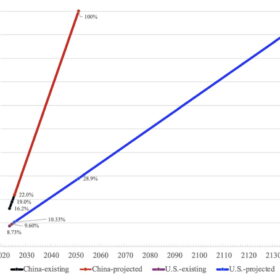Duke Energy embodies many of the contradictions that utilities face in the United States. And while the company has been actively building hundreds of megawatts of solar in more than a dozen states through its renewable energy division, sometimes it needs a little nudge to move further towards clean energy.
Today Duke Energy Florida announced the resolution of multiple legal disputes involving industrial customers, the Florida Retail federation and Florida’s ratepayer advocate, with a sharp move away from nuclear power and towards a future of solar, batteries and electric vehicles. Southern Alliance for Clean Energy was also part of this settlement, which has been sent to Florida regulators for approval.
Chiefly, if approved Duke’s Florida customers will no longer be on the hook for costs related to the Levy County Nuclear Power Plant, which Duke has finally formally abandoned after cancelling the construction contract four years ago. In its place the utility plans to “construct or acquire” 700 MW of utility-scale solar over the next four years, as well as to build, own and operate 50 MW of battery storage and install 530 electric vehicle charging stations.
This is a major acceleration of Duke Energy Florida’s previous plan to add 750 MW of solar over a ten-year period. The utility has already announced plans to build a 74.9 MW solar project in Hamilton County with construction starting in early 2018, but has not yet chosen a contractor. Duke Florida’s battery projects will be 500 kW to 10 MW in capacity, but the company was not able to provide further details.
Additionally, Duke Florida will introduce time-of-use rates for its residential customers, as well as increase deployment of smart meters.
The move away from nuclear is part of a downward spiral of the U.S. nuclear industry, which has been plagued by bankruptcies and project cancellations. In the Bloomberg New Energy Finance Future of Energy summit in April, utility executives consistently stated that they do not see existing nuclear technology playing much of a role in their future plans, and Duke’s move to quit Levy came shortly before a decision to cancel the Lee nuclear project following Westinghouse’s bankruptcy.
Duke estimates that its customers will save $0.005 per kilowatt-hour in rate reductions due to removal and consolidation of costs related to the Levy project, but as part of the settlement it still expects rates will still rise 1-3% annually from 2019 though 2021, or roughly the same rate as inflation. Duke notes that typical residential rates for its 1.8 million Florida customers are expected to remain “at or below” the national average.
This content is protected by copyright and may not be reused. If you want to cooperate with us and would like to reuse some of our content, please contact: editors@pv-magazine.com.









I would have thought by now that any reporting organization should know that electrical storage should be expressed as 50 MWh and not 50 MW as reported in the article title and body.